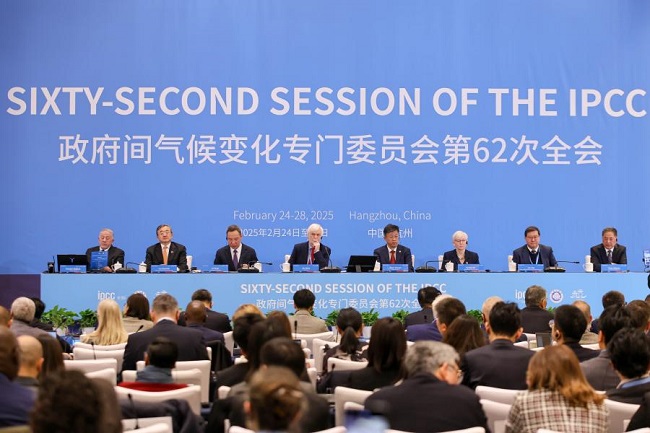The Intergovernmental Panel on Climate Change (IPCC) opened its five-day meeting on Monday, February 24, in Hangzhou, China, marking its first gathering of 2025.

The year began with a warning from the World Meteorological Organisation (WMO) that 2024 was the warmest on record – about 1.55°C above pre-industrial levels. Several UN dignitaries referenced this warning in their opening remarks, underscoring the urgency of science to accelerate climate action.
During its 62nd session, the Panel is due to review key elements of its Seventh Assessment Report (AR7), including draft outlines for each Working Group Report and for the Methodology Report on Carbon Dioxide Removal Technologies, Carbon Capture Utilization and Storage.
In their opening statements, host country representatives highlighted China’s progress toward a low-carbon society and reaffirmed their commitment to international climate science cooperation.
Li Yanyi, Vice Governor of Zhejiang, noted that renewable energy has, for the first time, surpassed coal power and pointed to investments in resilient infrastructure.
Calling for strong partnerships, he said: “If you want to go fast, go alone, but if you want to go far, go together.”
Liu Zhenmin, China’s Special Envoy for Climate Change, stressed the IPCC’s role in climate governance, noting its findings shaped the first Global Stocktake. He urged delegates to uphold scientific integrity, support the principle of common but differentiated responsibilities, and address global climate finance in AR7.
IPCC Chair, Jim Skea, highlighted “steady and important progress” since the start of AR7 and the Panel’s impact on the United Nations Framework Convention on Climate Change (UNFCCC) process. He outlined the “rich and demanding” agenda ahead and praised scientists and IPCC members for their dedication and continued support.
In video messages, Inger Andersen, Executive Director of the United Nations Environment Programme (UNEP), referenced the WMO’s warning, reminding delegates that “every degree, every day, every week counts” and urging them to finalize AR7’s timelines, outlines, and budgets.
UNFCCC Executive Secretary, Simon Stiel, also acknowledged the warning while reflecting on progress since the Paris Agreement. He noted that global investment in the energy transition exceeded $2 trillion in 2024 but cautioned that the window to keep warming below 1.5°C is closing, calling for accelerated action, particularly on adaptation.
Ko Barrett, Deputy Secretary-General of the WMO, reinforced the urgency of action, stressing that the cost of inaction far exceeds the cost of action. She praised China’s commitment to scientific collaboration and urged the IPCC to take “decisive action.”
Chen Zhenlin, Administrator of the China Meteorological Administration, reaffirmed China’s commitment to the IPCC, noting that more than 100 Chinese authors have contributed to its reports. He highlighted China’s participation in the UN’s Early Warnings for All initiative and its willingness to collaborate on global early warning networks.
Following the opening ceremony, IPCC-62 began deliberations in a closed session. Delegates considered IPCC-62’s agenda, the draft report of the 61st Session of the IPCC, IPCC’s budget for the years 2024-2027, the Scoping of the IPCC AR7 report, and the Outline of the Methodology Report on the Carbon Dioxide Removal Technologies, Carbon Capture, Utilization and Storage, among others.
